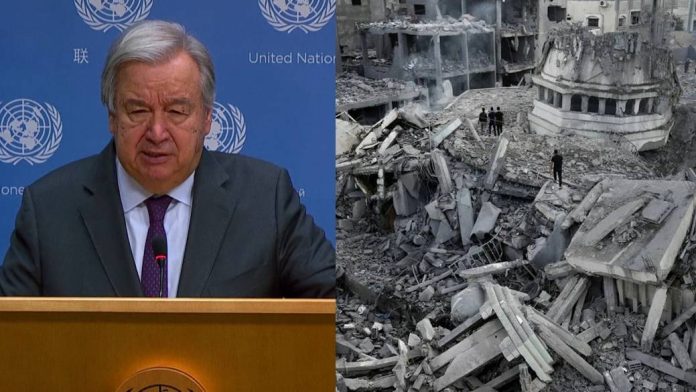Israel declared its regained control of the Gaza border after launching the most violent air strikes in the 75-year history of the territorial conflict with the Palestinians, despite Hamas’ threat to execute one hostage for each strike, according to CGTN.
Vowing to avenge the militants’ rampage, Israel called up hundreds of thousands of reservists and put the Gaza Strip, with a population of 2.3 million, under a total siege.
Israeli media reported that the death toll from Hamas attacks had risen to 900, the bulk of whom were civilians shot dead in their homes and on the streets. Dozens of Israelis were taken to the Gaza Strip as hostages.
Gaza’s Health Ministry reported that at least 770 Palestinians had been killed and 4,000 wounded by Israel’s airstrikes on the blockaded enclave since Saturday. Among the dead were 140 children and 120 women, a ministry spokesperson cited.
Three Gaza journalists were killed when an Israeli missile hit a building while they were reporting outside, resulting in the deaths of six journalists in Gaza since Saturday.
The Rafah crossing on the Gaza Strip’s southern border with Egypt’s Sinai Peninsula has been closed until further notice, an Egyptian security source reports. The shelling occurred close to the crossing.
Military spokesperson Rear Admiral Daniel Hagari:
We will reach them everywhere.
Israel’s next move could be a ground offensive on the Gaza Strip, a territory it abandoned in 2005 and kept under siege since Hamas took power in 2007. The full blockade, which Israel announced on Monday, includes cutting off even food and fuel access to the enclave.
The World Health Organisation has called for the establishment of a humanitarian corridor to and from the Gaza Strip.
UN Chief Antonio Guterres claimed he was “deeply distressed” by the announcement of the siege, and warned of the likely deterioration of the humanitarian situation in the strip “exponentially.”
Military spokesperson Hagari stated that no new infiltrations from the Gaza Strip had been recorded since yesterday.
Saturday’s attacks and Israeli retaliation shattered diplomats’ plans for the Middle East, with Israel on the verge of reaching a deal to normalise relations with Saudi Arabia, the richest Arab country.
Western countries expressed strong support for Israel, while Arab cities held street demonstrations in support of the Palestinians. Iran, which supports Hamas, welcomed the attacks but denied its direct role in them.
The US has promised to support Israel with ammunition and military hardware, also sending a group of aircraft carriers to the eastern Mediterranean.
Iranian Supreme Leader Ali Khamenei stated that the attacks had caused Israel an irreparable military and intelligence defeat.
Israeli Prime Minister Benjamin Netanyahu warned that the country’s military campaign after Saturday’s surprise mass attack was just the beginning of a long war aimed at destroying Hamas and “changing the Middle East.”
The Israeli army enlisted 300,000 reservists for its Swords of Iron campaign and deployed tanks and other heavy equipment both near the Gaza Strip and on the northern border with Lebanon.
The military said its troops had largely repelled fighting in the south and on the border around the Gaza Strip in exhausting battles with Hamas militants in about a dozen towns.
Around 1,500 bodies of Hamas (fighters) have been found in Israel around the Gaza Strip.
Global reaction
World powers and regional governments, including Egypt, Turkey and Gulf states, are keen to prevent any further escalation.
Saudi Arabia’s de facto ruler Crown Prince Mohammed bin Salman has told Palestinian President Mahmud Abbas that the kingdom is working to ensure that the military conflict does not affect the entire region, state media reports.
Turkish President Recep Tayyip Erdogan has warned Israel against “indiscriminate” attacks on civilians and moderately criticised Hamas, calling on both sides to respect the “ethics” of war.
French President Emmanuel Macron opposed suspending aid that “directly” benefits the Palestinians after the European Union said it was reviewing developments in the conflict.
The UN humanitarian office reported that nearly 200,000 people, or almost a tenth of the population, had fled their homes in the Gaza Strip since the beginning of the fighting.
Displacement has escalated dramatically across the Gaza strip, reaching more than 187,500 people since Saturday. Most are taking shelter in schools.
A World Health Organisation spokesperson reported 13 attacks on health facilities in the Gaza Strip, noting that the medicines stored there had already been used up.
